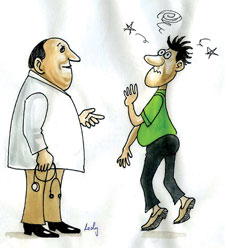Healthwatch
|
Compiled and coordinated by Edward
Arambewala |
Sri Lanka:
Two million people are asthmatics - why?
At a medical seminar on Asthma held in Colombo last week doctors said
“Two million people in Sri Lanka are found to be asthmatics now and it
is on the increase, mostly because of lack of public education on this
disease which has resulted in most patients who come with early symptoms
to doctors not accepting doctor’s diagnosis thinking that they have only
a phlegm problem, and don’t take the medications prescribed.”
The seminar was organised by the Association of Pulmonologists Sri
Lanka sponsored by GSK Pharmaceuticals and was held at Excelworld
auditorium at Darley Rd. Colombo.
 Consultant Chest Physician Dr. Amitha Fernando speaking at length on
this topic, and calling upon media corporation to take this message to
the public gave out the following details: Consultant Chest Physician Dr. Amitha Fernando speaking at length on
this topic, and calling upon media corporation to take this message to
the public gave out the following details:
What is Asthma?
The air we breathe is carried into and out of our lungs by a system
of finely branching tubes. These tubes begin from the trachea (wind
pipe) in our throat and is connected to the nose and upper air passages.
The trachea as it travels in our chest cavity divides into two main
branches (the right and left main bronchi) each of which divide
repeatedly like branches of a tree until they reach the air exchanging
surfaces of the right and left lungs.
These tubes consists of a wall line by muscle and a hollow interior
which allows the smooth passage of air. The hollow interior is lined by
tissue rich in blood vessels, nerve endings and mucous (phlegm) glands.
It is essential that the hollow interior is maintained without narrowing
or obstruction of its inner surface for the smooth passage of air.
What causes asthmatic airways to behave in this way?
The reasons for this is not fully understood. However, it is known
that certain factors predispose to asthma.
1. Hereditary (genetic predisposition), asthma and allergies run in
families. If we have a parent or a family member known to have asthma or
“allergies” it is likely that asthma may be inherited.
2. Environmental factors.
3. A. ‘westernized life style’ may contribute in those who are
hereditary predisposed to the development of the disease.
What are the symptoms of asthma?
* Difficulty in breathing and limitation of physical activity.
* “Tightness of chest”.
* Cough.
* Wheezing or whistling noises in the chest.
In the majority of asthmatics these symptoms come in episodes. In
between patients experience symptom free periods.
There is a pattern to these symptoms. Symptoms are worse during the
night, early hours of the morning or on awakening.
What are the factors that bring on symptoms of asthma?
These can be divided into two groups.
1. Allergens -
Asthmatics develop an allergic reaction when exposed to certain
factors.
* Dust mites, tiny insects too small to see. They live in mattresses,
carpets, furniture, bed linens, mosquito nets and stuffed toys.
* Pests, Cockroaches, rats, mice. Small pieces of dead cockroaches
and roach droppings settle in household dust and can end up in the air
we breathe giving rise to worsening of asthma.
* Mold release spores into the air that can trigger asthma. Mold tend
to grow on damp walls, bathrooms, in agricultural areas where paddy
harvest is stored.
* Pollen from grasses, paddy etc.
* Animal fur from pets such as cats, dogs, their urine, skin and
saliva can trigger asthma. Lovebirds, budgerigars, pigeons are potent
sources of allergens.
* Certain food additives, colorings, preservatives can give rise to
asthma symptoms.
* Hair dyes (henna products in particular) perfume sprays can
precipitate an asthma attack.
Are there certain foods that asthmatics should avoid?
Some people suffer from an acute reaction after eating nuts or
shellfish (crab, prawn, squid). Patients develop widespread itchy
rashes, swelling of lips, throat, tongue, breathing becomes difficult,
wheezing, faints and collapse may occur. Such reactions occur within
minutes or eating the particular food. This is a serious and life
threatening condition (anaphylaxis) and individuals prone to such
reactions should avoid these foods completely.
All asthmatics may not be allergic to these types of foods.
Most asthmatics are allergic to foods containing preservatives such
as metabisulfites. These are found in beers, wines, synthetic drinks,
sausages etc.
Tartrazine a yellow coloured dye that is added to certain foods such
as potato chips, coloured drinks can also make asthma worse.
Flavouring agents such as monosodium glutamate, excessively used in
Chinese restaurants (found in soy sauce) can bring on asthma symptoms.
As a general rule it is best that you find out for yourself the types
of foods that make your asthma worse and avoid them.
60 per cent of asthmatics believe that diet has a major impact on
their asthma symptoms. In reality the contribution of diet to asthma
symptoms is only 2 per cent. Therefore strict dietary restrictions are
unwarranted.
Can asthma be cured?
Asthma like high blood pressure, diabetes is termed a chronic
disease. In such diseases doctors talk in terms of control. Most
patients with asthma can be treated to achieve very good control of
their symptoms. However they need to be on inhaled medication for many
years. In most patients this may even be lifelong.
Don’t feel distressed
It has been estimated that there are around 300 million asthmatics
worldwide.
Over the past decade asthma has increased by over 50% worldwide. It
has been documented that 25% of children and 10% of adults suffer from
asthma.
In Sir Lanka available data suggests that there around 2 million
asthmatics. It is the second most frequent cause of hospitalization.
Asthma causes much suffering disruption of day to day living in terms of
an illness leads to lose of income in those employed and hampers
schooling and education in children.
If you suffer from asthma do not feel distressed. Over the past years
much has been learnt of asthma. New very effective medicines have become
available and doctors are equipped with new strategies in combating this
condition.
Word of guidance to Medical Interns from the Minister of Health
Minister of Healthcare and Nutrition Nimal Siripala de Silva in a
guidance message to Medical Interns said, “Sri Lanka is proud of its
achievements in the field of healthcare, which is amply substantiated by
our health indicators which are comparable to those in the developed
world.”
The message is carried in a booklet for Medical Interns published by
the Medical Services Division of the Healthcare and Nutrition Ministry
under the Ministry’s Health Sector Development project.
The booklet is titled “A word of Guidance to Medical Interns”. In his
message the Minister further adds, “One of the important factors that
contributed to this success story is the commitment and dedication of
all the healthcare workers functioning at different levels in the
Ministry and peripheral institutions”.
“The brief but valuable information in this booklet would guide you
to become worthy professionals to whom the Sri Lankan public could truly
be grateful for”.
The Ministry Secretary Dr. Athula Kahandaliyanage in his message
said, “I am very happy that the Ministry of Healthcare was able to
provide you with the opportunity for training as a medical intern to
improve your knowledge and also to gain the necessary understanding and
skills to treat the sick”.
“The guidance gained from this booklet will assist you to achieve
this difficult but essential part of your training”.
The Director General of Health Services Dr. Ajith Mendis said, “This
publication (the booklet) summerizes some of the key issues that would
guide you to continue to function without being involved in litigations
and to look after the patients in a manner that could be proud of.
10 Strategies to Help Prevent Heart Disease
Jessie Sholl
Don’t miss a beat! Check out these simple
measures you can take today to promote a healthier heart.
Heart Disease Prevention
Though some of us are born with a genetic predisposition for heart
disease, that doesn’t mean it’s inevitable. There are many ways you can
prevent the onset of heart disease — and keep it from worsening if you
have been diagnosed with a specific heart issue. Here are some
time-tested heart-disease prevention strategies to initiate:
1. Eat More Fiber
The American Heart Association recommends having a few meatless meals
each week and increasing the amount of fiber and whole grains in your
diet.
There are lots of ways to do this. Registered dietitian Jill Nussinow
suggests eating “whole grains, such as oatmeal, barley, quinoa, brown
rice, beans and lentils, nuts, and seeds, in moderation; as well as soy
products, if you tolerate them, in moderation; and fruit. Remember,
plant foods contain fiber, and animal foods do not. Conversely, animal
foods contain cholesterol, and plant foods do not.”
2. Maintain a Healthy Weight
“In terms of heart disease, everything goes in the wrong direction
when you’re overweight,” says George P. Rodgers, MD, a cardiologist in
Austin, Texas. “But when you lose the weight, that all starts to correct
itself: Blood pressure comes down, glucose comes down, HDL [“good”
cholesterol] goes up. All the good things start to happen when you lose
weight. And it doesn’t have to be a ton of weight; it could be a matter
of losing 15 pounds.”
3. Get More Exercise
The American Heart Association recommends 30 minutes of exercise six
times a week. Make it fun by going to a class at the gym or by getting a
friend to work out or walk with you.

That way, you’re more likely to be consistent. And if there are days
when fitting in even half an hour seems impossible, break it into
shorter intervals — a 10-minute walk in the morning, another at
lunchtime, and then 10 minutes at night.
4. Count Your Steps
Pedometers are practically a fashion statement these days, which is a
good thing for heart health! Joanne Larsen, a registered and licensed
dietitian with extensive clinical experience in nutrition counseling,
says: “If you wear a pedometer that counts steps, aim for 10,000 steps a
day.” Not meeting your goal? Go for walk breaks instead of a snack
breaks at work, and take the stairs whenever possible.
5. Read Labels
“Sometimes the full-fat version of a food is actually better for you
because the low-fat or nonfat versions often have a similar calorie
level, but way more sugar,” Nussinow says. “Other times, products may be
lower in calories but have a lot more sodium.
It’s usually better to have smaller amounts of the real food,
especially with peanut butter. People should be reading labels because
they often aren’t buying what they think they are.”
To be continued next week
Laughter the best medicine

Doctor: I have some bad news and some very bad news.
Patient: Well, might as well give me the bad news first.
Doctor: The lab called with your test results. They said you have 24
hours to live.
Patient: 24 HOURS! That’s terrible! WHAT could be WORSE? What’s the
very bad news?
Doctor: I’ve been trying to reach you since yesterday.
Sent by R. P. Siriwardena, Panadura.
SLMA congratulates President Mahinda Rajapaksa
The most significant event in any person’s calendar in Sri Lanka is
the victory over terrorism.
SLMA joins the nation in congratulating the Armed Forces and
President Mahinda Rajapaksa whose well focused resolve and leadership
paid dividends,” Prof. Rezvi Sheriff President Sri Lanka Medical
Association said in a special message to doctors carried in the SLMA
special news letter.
“Many SLMA members have contributed towards the needed care in the
internally displaced persons’ camps and in referral hospitals”, Prof.
Sheriff said.
The SLMA too has a program of rotating doctors in the Vavuniya camps.
Please contact our Secretary if you want to get into a weekly roster and
offer health care. SLMA sincerely hopes that Sri Lanka can quickly
bounce back into natural civilian life where all communities can live
with dignity and equity of all opportunities Sri Lanka has on offer for
its people.
Prof. Rezvi Sheriff, President, SLMA, President’s message for May
newsletter.
Reuters Health News Summary
Following is a summary of current health news briefs.
Scientists identify gene that may explain hair loss.Researchers in
Japan have identified a gene that appears to determine cyclical hair
loss in mice and believe it may also be responsible for hair loss, or
alopecia, in people.
In a report published in the Proceedings of the National Academy of
Sciences, the scientists described how they generated a line of mice
that were lacking in the Sox21 gene.
Refusing whooping cough vaccine shown to raise risk One in 20
children whose parents do not get them vaccinated against whooping
cough catch the highly contagious virus, researchers said on Tuesday.
Only one in 500 children who got vaccinated developed whooping cough in
the study by Kaiser Permanente Colorado’s Institute for Health Research.
Opposites attract in human search for mate
When it comes to choosing a mate, opposites really do attract,
according to a Brazilian study that found people are subconsciously more
likely to choose a partner whose genetic make-up is different to their
own.
They found evidence that married couples are more likely to have
genetic differences in a DNA region governing the immune system than
were randomly matched pairs.
Quick pep talks help with weight maintenance
Checking in with a nurse every couple of weeks is just as effective
for helping people maintain weight loss as an intensive and much more
expensive program involving longer sessions with dieticians and exercise
trainers, New Zealand researchers report.
Dr. Jim Mann of the Edgar National Center for Diabetes Research in
Dunedin and colleagues randomly assigned 200 women who had lost at least
5% of their body weight to the nurse-led support group or an
intensive-support program.
Meat intake not linked to breast cancer
A large study has found no link between eating meat - total meat, red
meat, processed meat, or meat cooked at high temperatures - and the risk
of breast cancer in older women.
Some studies have found that women who eat a lot of red and processed
meat are more likely to develop breast cancer than other women; but
other studies have found no such link. Saturated fat, found mainly in
animal products, has been tied to higher breast cancer risk in some
studies, but not in others.
Experts identify toxic compound in deadly mushroom
Scientists have said they had identified the toxin in a species of
mushroom that killed seven people in Japan in recent years.
In an article published in Nature Chemical Biology on Monday, the
researchers said they isolated the poisonous compound in the mushroom,
Russula subnigricans, and confirmed its toxicity by feeding it to mice.
REUTERS
Drug combo helps slow lung cancer: study
The combination of two anti-cancer treatments following standard
chemotherapy can slow advanced non-small cell lung cancer, according to
a study unveiled Saturday.
Patients treated with a combination of Tarceva, sold by the Swiss
drugmaker Roche, and Avastin, a drug by Roche’s Genentech unit, saw
their cancer growth slow more than a control group treated with Avastin.
More than 750 patients were randomized to receive Avastin and a
placebo, or Avastin and Tarceva.
Those in the Tarceva group survived an average of 4.8 months before
the cancer started growing again, compared to 3.7 months for the control
group, said Vincent Miller, the study’s main author.
AFP
Prize winners
The following won prizes at the Healthwatch Medical Crossword No. 37
draw held last week at the WISH auditorium at Delkanda, Nugegoda.
The crossword is sponsored by the Wickremarachchi Institute of sight
and hearing WISH headed by Mihiri Wickremarachchi.
First prize Rs.3000 Entry No. 40, P.M. Bartholomeusz (79
yrs-pensioner) No. 23 Agalawatta Rd. Matale.
Second prize Rs.2000 Entry No. 5, R.D.J. Amath (student 22 yrs) No.
40/41 Katuwawela Rd. Borelesgamuwa.
Third prize Rs.1000 Entry No. 31, M. Dissanayake (student - 22 yrs)
No.22 Jayamawatha, Bangalawatta, Kottawa.
Three consolation prizes of Rs.1000 vouchers from Wickremarachchi
opticians Entry No. 20 R.P.M. Petumal 64 yrs, Music Teacher, Kotahena.
Entry No. 59 S.P.G.C. Senadheera 26 yrs, 76/24 Sunethradevi Rd.
Nugegoda. Entry No. 60, S.P.B.M. Senadheera, 20 yrs, student 76/24
Sunethradevi Rd, Nugegoda.
Three consolation prizes of Rs.1000 each from Parkway Group
Healthcare Colombo Office
Entry No. 26 C. Cadramanpulle 57 yrs Housewife, 64/2B centre Rd,
Colombo 15.
Entry No. 8 R.P. Podmenike 68 yrs, Rtd Teacher, 50/03 Gampolawela Rd,
Gampola.
Entry No. 39, A.N. de Croos 59 yrs, Rukmanidevi Mawatha, Negombo.
Daily News editorial, with Healthwatch Medical Crossword Sponsors
WISH Institute, Parkway Group Healthcare congratulates the prize winners
and wish best of luck to the others. |



